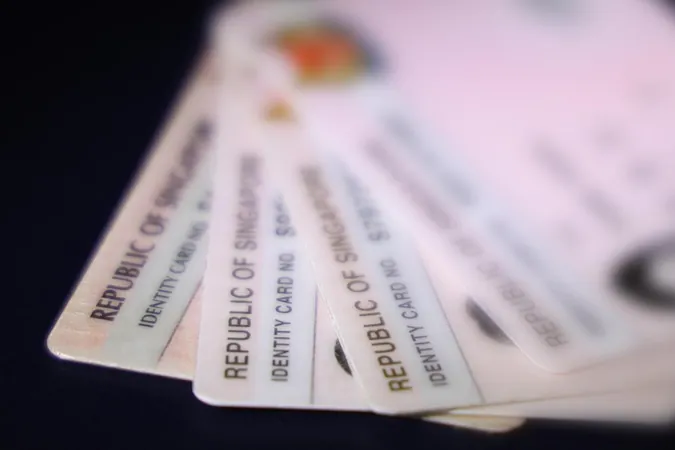
Alarming Discovery: Your NRIC Number Could Expose Your Home Address, Medical Records, and Bank Accounts!
2024-12-22
Author: Yu
Introduction
SINGAPORE - A recently exposed flaw in the Accounting and Corporate Regulatory Authority’s (Acra) database has raised serious concerns about the security of personal information linked to individuals' NRIC numbers. In early December, it was revealed that full NRIC numbers of representatives from registered companies were accidentally made accessible via the new Bizfile web portal. This unintentional breach poses significant cyber-security threats, as criminals can easily exploit these numbers to uncover sensitive data.
Cyber-security Threats and Risks
Cyber-security professionals are sounding the alarm, warning that NRIC numbers can act as gateways for malicious actors to impersonate authorities, perpetrate scams, or commit identity theft. During the brief window when the information was publicly available, experts believe that bad actors may have used automated algorithms to harvest this data en masse, amplifying risks for those affected.
Details of the Breach
The breach, reported on December 9, allowed anyone to view the personal details of registered individuals, including key business figures and politicians, which Acra later apologized for and subsequently disabled the problematic feature. However, cybersecurity experts are urging individuals to remain vigilant, stating that the potential for scams still lingers due to the harvested personal data.
Acra's Response
To compound the issue, Acra attributed the oversight to a misinterpretation of an internal memo from the Ministry of Digital Development and Information (MDDI) regarding future protocols for NRIC numbers. The exact number of exposed NRIC numbers has not been disclosed, further heightening the uncertainty surrounding the breach.
Government's Position
Minister Josephine Teo of MDDI addressed the issue at a press conference, signaling an urgent need for public awareness regarding the appropriate use of NRIC numbers in both public and private sectors. She called for businesses to cease relying on NRIC numbers for identity verification, especially for critical activities like fund transfers.
Impact on Healthcare
In a startling revelation, a recent investigation showed that local healthcare systems still utilize NRIC numbers to access sensitive personal information, including patients' registered addresses, contact details, and medical histories. Cyber-security expert David Siah warned that this accessibility could facilitate malicious acts, allowing scammers to use unique data, such as a person’s medical condition, to make their ploys more credible.
Broader Implications
Moreover, potential threats don't stop there. The Registry of Marriages, accessible through the Singpass authentication tool, allows users limited annual searches for marital status, but this feature too poses risks if compromised. Additionally, banks often require NRIC numbers for immediate assistance in freezing accounts to prevent fraud, highlighting the double-edged sword of convenience versus safety.
Banking Sector's Reaction
Banking institutions are engaged in a heated debate over the appropriate use of NRIC numbers, especially following incidents where thieves impersonated individuals to halt credit card transactions while they were away on vacation. Although banks argue that their processes are essential for security, the incident raises questions about the balance between protecting customer data and ensuring convenience.
Review of Practices
In light of the fallout from the incident, banks and insurance companies are now reviewing their practices regarding the use of NRIC numbers, with potential changes on the horizon. The MDDI has recommended that full NRIC numbers be limited to instances demanding strict identity verification, such as hotel check-ins and medical appointments, while discouraging their use for less critical functions like retail memberships or promotions.
Advice for Individuals
According to cyber-security consultant Shane Chiang, the responsibility to safeguard information predominantly falls on organizations, which must implement robust cyber-security measures to minimize reliance on NRICs for authentication. Individuals are advised to bolster their online security by activating two-factor authentication and exercising caution when engaging with unfamiliar communications.
Conclusion
As personal data breaches become increasingly common, it is essential for both organizations and individuals to remain proactive in protecting sensitive information. The implications of lax security can be severe, resulting in financial loss, identity theft, and emotional distress for victims.
Call to Action
Stay vigilant—a single NRIC number could unlock a trove of your private information!


 Brasil (PT)
Brasil (PT)
 Canada (EN)
Canada (EN)
 Chile (ES)
Chile (ES)
 España (ES)
España (ES)
 France (FR)
France (FR)
 Hong Kong (EN)
Hong Kong (EN)
 Italia (IT)
Italia (IT)
 日本 (JA)
日本 (JA)
 Magyarország (HU)
Magyarország (HU)
 Norge (NO)
Norge (NO)
 Polska (PL)
Polska (PL)
 Schweiz (DE)
Schweiz (DE)
 Singapore (EN)
Singapore (EN)
 Sverige (SV)
Sverige (SV)
 Suomi (FI)
Suomi (FI)
 Türkiye (TR)
Türkiye (TR)